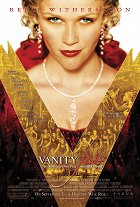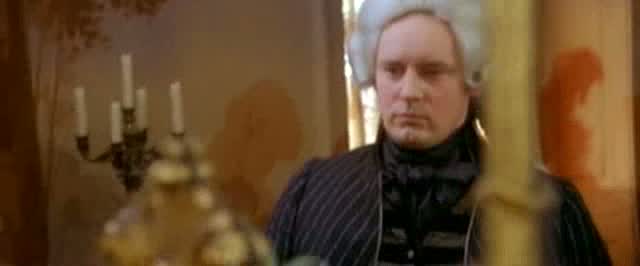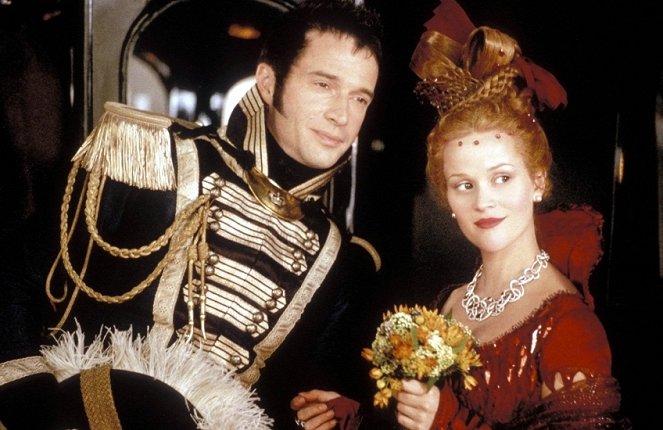Directed by:
Mira NairCinematography:
Declan QuinnComposer:
Mychael DannaCast:
Reese Witherspoon, Gabriel Byrne, Roger Lloyd Pack, Ruth Sheen, Lillete Dubey, Romola Garai, Tom Sturridge, Rhys Ifans, Jonathan Rhys Meyers, Bob Hoskins (more)VOD (1)
Plots(1)
The daughter of a starving English artist and a French chorus girl, Becky is orphaned at a young age. Even as a child, she yearns for a more glamorous life than her birthright promises. As she leaves Miss Pinkerton's Academy at Chiswick, Becky resolves to conquer English society by any means possible. She deploys all of her wit, guile, and sexuality as she makes her way up into high society during the first quarter of the 19th century. Becky's ascension to the heights of society commences when she gains employment as governess to the daughters of eccentric Sir Pitt Crawley. Becky wins over the children, and the Crawley family's rich spinster Aunt Matilda as well. The rural Hampshire household comes to find her indispensable, and Matilda comes to confide in the bright young woman. But Becky knows that she cannot be a true part of English society until she moves to the city. When Matilda invites her to come live in London, Becky eagerly accepts. There, Becky is reunited with her best friend Amelia Sedley, who-having grown up comfortably--does not share Becky's more brazen ambitions. Hewing close to the family she already knows so well, Becky secretly marries dashing heir Rawdon Crawley but when Matilda discovers their union, she casts the newlyweds out. When Napoleon invades Europe, Rawdon bravely reports to the front lines. Pregnant Becky stands by distraught newlywed Amelia, whose own husband George Osborne is also called to fight. When George does not survive the Battle of Waterloo, Becky's friendship with Amelia is strained beyond repair. Becky is reunited with Rawdon and gives birth to a boy, but, post-war, money and comforts are sparse for the trio. More intent than ever on gaining acceptance into London society and livingwell, Becky finds a patron in the powerful Marquess of Steyne. Steyne's whims enable Becky to realize her dreams, but the ultimate cost may be too high for her. (official distributor synopsis)
(more)Videos (1)
Reviews (4)
An inconsistent mix of Dangerous Beauty (the breakdown of the main character) and The Age of Innocence (similar characterization of the period), which, however, does not take the best ingredients from either and thus remains somewhere in the middle between a fully-fledged serious drama and a delightful romance. The actors, except for a few moments, are very convincing, with Gabriel Byrne taking the lead, but Reese Witherspoon, who until then had been seen by audiences only as a little pink yapper from Legally Blonde, showed that she can also handle a more serious role without hesitation. Technically, it is flawless, with outstanding costumes, London scenery, and vibrant camerawork. The atmosphere of the Victorian era is masterfully and elegantly recreated, but unfortunately, the content is sometimes quite disjointed and dull.
()
The trend of converting literary classics into film form is relatively traditional, gaining importance again in recent years, but "Jarmark marnosti" does not completely approach what the film "Pýcha a předsudek" achieved a year later. The period portrayal is good, but the story is not one that completely captivates a person. I do not like Reese and she did not convince me here that she would be any kind of exceptional actress. I am planning to watch "Barry Lyndon" for the second time in the foreseeable future, also an adaptation of Thackeray, and I know that I will have better feelings about it even though it is a film an hour longer.
()
Up until now, I've only associated Thackeray in cinema with Barry Lyndon, who is too Kubrick to be Thackeray. But thankfully "Vanity Fair" is a novel that is adapted very often, and this latest version so far is very charming and inspiring. While there was a brilliant 1930s short in the beginning (1911), one sexy modern version with Myrna Loy, and another traditional one in Technicolor with Miriam Hopkins, this one with the charming Reese Witherspoon puts the whole story in an Indian context and tells of all the nice and unpleasant things that befell poor Becky Sharp. Although Becky would never call herself poor, would she? These lavish novels in Empire splendor can really only gain when directed by someone as cosmopolitan as Mira Nair. Yes, the Mira Nair whose Monsoon Wedding meant so much to the revival of interest in Indian film and Indian culture in the West. Basically, I have to recommend it. And if you're still not sure, take your time. I waited a decade for my Vanity Fair encounter and it was worth it.
()
Some comments did warn me, but the cast led by my favorite actress Reese Witherspoon looked promising and, above all, from the first shots, the set design seemed great. I had a sense of an authentic touch with the distant past. However, with each passing minute, my disappointment grew. The film could have been made as a social drama about an outsider girl who wanted to escape the unattractive prospects of her social class at all costs. Her background and occupation as a governess in an aristocratic family would allow her to become an observer from below with the ability to capture life across all social classes - especially during the exceptional and uncertain period of the Napoleonic Wars when human characters were shaped and many lives were turned upside down. Unfortunately, the film gets lost in the penny-dreadful, which turns promising solutions into banalities and romantic clichés. The director doesn't commit outright atrocities, but she fails to extract a strong and impressive story from this promising material. Comparing it to Bondarchuk's monumental War and Peace, considering the exceptional nature of the source material, may not be fair, but to some extent, it explains my doubts and low rating. Overall impression: 40%. 1 star is for the set design, and the second is for the visual sophistication.
()



Ads